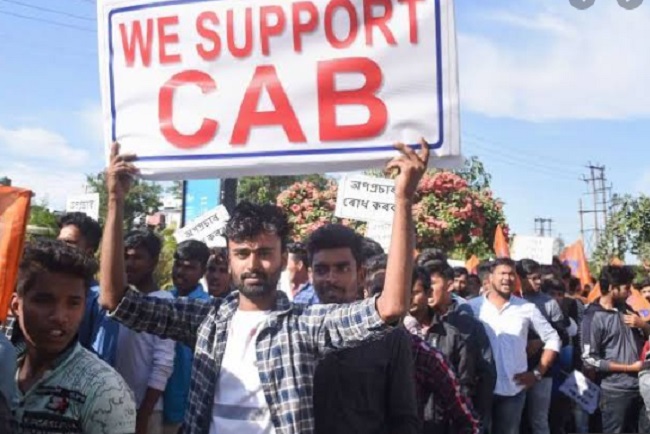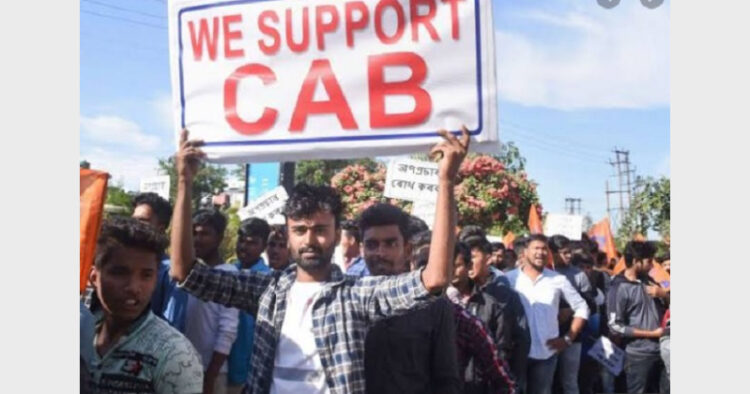
Adv KV Sreemithun
India has a glorious tradition of protecting the weak, this tradition has been rooted in its immemorial past, it’s not a new age phenomenon, but which is part of the great Indian tradition and culture. Our Nation won Independence in 1947, but the freedom was gifted with deep bruises, the Nation had to pay a price for the freedom, the two Nation theory staunchly advocated by Muhammad Ali Jinnah, coupled with the little resistance from Indian National Congress, to the divisive agenda propounded by Jinnah resulted in Partition. Jinnah became, Quaid-i-azam, and the first Governor General of Pakistan, the bloody battle for a Muslim state became a reality. When India retained its character as a Nation, graced with its inherent qualities, inherited from its rich and diverse past, which essentially included protecting its minorities, Pakistan became a synonym for religious persecution of its minorities. The religious minorities faced, severe persecution based on their religious identity, the places of worship, their lives were all left on the altar of the mercy of the majoritarian Islamic State.
When we look into the very genesis of Pakistan, it’s a state born out of immense hatred and enmity to the fellow beings, it’s very birth is rooted in a separate religious identity, it’s fathers, propagated that they could never live with the Hindus and essentially there has to be a division of the population on religious lines. India, retained its rich culture of preserving diversities, while no such attempts took place in Pakistan, resulting in the concretizing, of a more hardened Islamic Country. As the Islamic identity of Pakistan kept on hardening under various regimes it had, the minorities of Pakistan, especially the Christians, Sikhs, Buddhists and Hindus were at the receiving end. The “right to life” degraded, the rampant forceful religious conversions of Christians and the Hindus, the attacks on the religious worship places of Christians and the Hindus and the other minorities, made life hell.
Along with Pakistan, the sub-continent also witnessed, religious persecution in Afghanistan and Bangladesh as well, these countries and it’s the treatment of religious minorities raises a million-dollar question, why the religious minorities are persecuted here in these three Countries? Why exodus of Christians, Sikhs, Buddhists and Hindus take place quite often and thirdly, why the persecuted minorities of Paksitan, Bangladesh and Afghanistan seek asylum in India? The answer is, it’s because of the faith in India as a Nation capable to protect diversity, inherited from its immemorial past, which drives the minorities of Pakistan, Bangladesh and Afghanistan, like, the Christians, Sikhs, Buddhists and Hindus to seek protection to their lives in India. Since two out of the three countries from which minorities are permitted, comes under Sharia law it’s imaginable their own religious rights won’t be protected or their concerns as minorities won’t be addressed, so it makes no sense that the majority community who is in a superior pedestal due to Sharia should be allowed here as they face no persecution. The third country’s famous writer who highlighted the plight of its minorities had to seek asylum in India to protect herself, so it clearly portrays the sad state of affairs in these three countries.
The Government of India after considerable analysis of the grave situation and the religious persecution faced by the religious minorities in the neighbouring countries, brought the following amendment in the Citizenship Act of 1955 and has also duly taken care of the North Eastern States by limiting the applicability in the respective States in clear terms of Sec 6(b) 4.2. In the Citizenship Act, 1955 (hereinafter referred to as the principal Act), in section 2,in sub-section (1), in clause (b), the following proviso shall be inserted, namely:—
“Provided that any person belonging to Hindu, Sikh, Buddhist, Jain, Parsi or Christian community from Afghanistan, Bangladesh or Pakistan, who entered into India on or before the 31st day of December, 2014 and who has been exempted by the Central Government by or under clause (c) of sub-section (2) of section 3 of the Passport (Entry into India) Act, 1920 or from the application of the provisions of the Foreigners Act, 1946 or any rule or order made there under, shall not be treated as illegal migrant for the purposes of this Act;”.
The brutal killing of Afghanistan’s former President Najibullah by Taliban after abducting him from the custody of United Nations, the subsequent targeting of Bamiyan Buddha statues, the world’s largest standing Buddha statues, were examples of religious hatred in neighbouring countries, Najibullah had even tried to seek asylum in India but his attempt failed. It can be imagined by any person of average intellect, if statues of Lord Budhha are not left alone, will the living beings of these minority Buddhists, be allowed to live there? The genocidal action in these neighbouring countries had even touched the Former Prime Minister, Shri. Manmohan Singh, too had strongly advocated a liberal approach in granting citizenship to the persecuted minorities in these neighbouring countries if circumstance demands, in the light of the said statement, the present hue and cry over the Citizenship Amendment Bill by a section of opposition parties are all sound and fury signifying nothing.
The amendment does not take away the rights of any Indian minority communities, on the other hand, it is offering protection to the right to life of minorities, who are subjected to inhuman cruelties, the spirit of Constitutionalism is being held to a new high by the Government of India, rising up to its responsive role as a Nation committed to the rights of religious minorities and committed to the International treaties in this regard. Those Chief Ministers who say, they won’t implement the amendment would do a great service to their people, if they take the Constitution of India from the bookshelves of their good offices and spare a little time to go through the sacred document. The Article 11 says: Nothing in the foregoing provisions of this part shall derogate from the power of Parliament to make any provision with respect to the acquisition and termination of citizenship and all other matters relating to citizenship. Article 246(1) read with Entry 17 of List 1, Schedule VII would put an end to the meaningless claims made in the spur of the moment to incite passions. Our Parliament, has unfettered power to make laws with respect to citizenship, naturalization and aliens. The divide and rule was a British Policy tactically used to continue the imperialist rule over India is again on return now, used by the opposition, the opposition parties led by Indian National Congress who are duty-bound to play the role of a responsible opposition, have forgotten their duties and are stocking communal fire on streets, sowing seeds of fear, in Indian minorities, through a false propaganda that they are going to be ousted, this is nothing but playing with fire, a fire which will damage the spirit of Constitutionalism, the peace and brotherhood existing in our society.













Comments